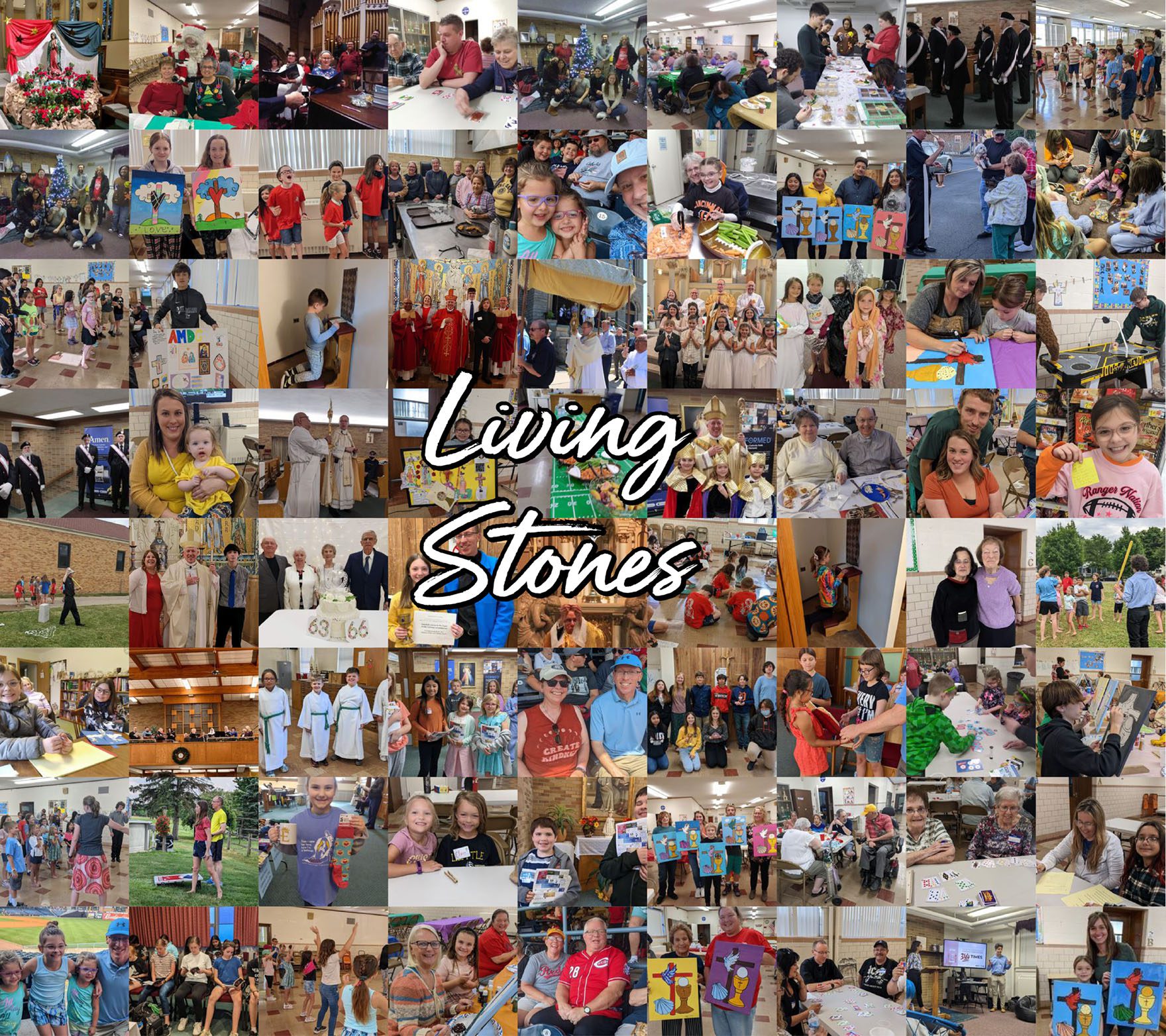
5th Sunday of Easter
To All the Marian Devotees of the Epiphany of the Month of May
Today, Choose to Love Like Jesus: Be Patient, Forgive Freely, Serve Humbly, Love Generously
(The Fifth Sunday of Easter, John 13; 31-33a, 34-35, 18 May 2025)
Christ has no body now on earth but yours, no hands but yours, no feet but yours,
Yours are the eyes through which to look out Christ’s compassion to the world Yours are the feet
with which he is to go about doing good; Yours are the hands with which he is to bless men now.
(Saint Theresa of Avila, The Interior Castle, London 1852)
Dear brothers and sisters, “Life can only be understood backwards, but it must be lived forwards.” These words from the Danish theologian Søren Kierkegaard come to mind as we reflect on today’s Gospel reading.
We hear this story during the Easter season—after Jesus has died and risen—but the event it describes took place before that first Easter. In this way, we find ourselves doing what the disciples did: looking back at Jesus’ life on earth through the lens of His death and resurrection.
Much of what Jesus said and did only became clear to the disciples after Good Friday and Easter Sunday. And the same is true for us. As His followers, we live looking ahead, but often understand more deeply by looking back.
The Gospel of Fifth Sunday brings us to one of the most intimate and solemn moments of Jesus’ earthly life: the Last Supper. Judas has just departed to betray Him, and Jesus knows His time is short. In that moment, He does not give a final warning or deliver a theological discourse. Instead, He offers a simple yet profound command: “Love one another. As I have loved you, so you also should love one another.”
What Is “New” About This Commandment? The command to love is not new in itself. Even in the Old Testament, God commands, “Love your neighbor as yourself.” But Jesus takes this command further. He does not say, “Love others as you love yourself.” He says, “Love one another as I have loved you.” That is something radically different.
The standard is no longer our own love for ourselves—it is the love of Christ: a love that stoops to wash the feet of others like a servant, a love that forgives enemies, even in the agony of the Cross, a love that lays down its life freely and without condition. This is sacrificial love. Costly love. Love that does not wait to be loved first.
How Did Jesus Love Us? He loved us while we were still sinners. He touched the untouchable. He welcomed the outcast. He never withheld mercy from the repentant. He gave everything—even His last breath—for our sake. When Jesus says, “Love one another as I have loved you,” He is not asking for admiration. He is calling us to imitation. To live as He lived. To love as He loved.
Love as the Mark of a Christian Jesus says: “This is how all will know that you are my disciples: if you have love for one another.” It is not our buildings, our liturgies, or even our theological correctness that first speaks to the world—it is love made visible. Love in the way we treat one another in our families. Love in how we forgive within the Church. Love in how we serve the poor, the lonely, the forgotten. If the world looks at us and does not see love, then we have failed to reflect Christ. But if they do see love, then they begin to see Him.
A Daily Decision To love like Jesus is not a one-time heroic act—it is a daily decision: To be patient when we are weary. To forgive when we have been wounded. To reach out when we would rather pull away. To speak kindly when we feel irritated. It is difficult—but it is the path to true joy. Because when we love like Jesus, we begin to live like Jesus.
Dear friends, this “new commandment” is not a mere suggestion. It is the very heart of Christian life. And it is the most powerful testimony we can offer to a divided and hurting world.
So today, let us pray: “Lord Jesus, teach me to love like You. Help me to forgive, to serve, and to give myself as You gave Yourself for me.” Only then will the world not merely hear what we believe—but come to know whom we follow.
To Know Jesus is to Know God. If we want to understand who God is, what God desires, and how God acts, we must turn to Jesus—the Word made flesh. Jesus does not just point out the way—His life of humble, generous service is the way. He does not merely speak of truth—He is the perfect revelation of a God whose love knows no end. He does not simply preach about heaven—He is risen and invites us into the very life of God. By embracing His Spirit and living out the hope of His Word, we encounter not just a great teacher or moral example. We encounter, in Christ, God Himself.
Jesus is the Way Jesus declares, “I am the Way, the Truth, and the Life.” These are not mere words—they are a profound revelation. As the eternal Son of God who became fully human, Jesus is the visible expression of all that the Father is. He is the Way because through Him—through His life, His teachings, His death, and resurrection—we are led to the Father, who is Truth and Life.
Unlike other spiritual leaders and thinkers throughout history, Jesus speaks with divine certainty. Lao-Tse, founder of Taoism, encouraged detachment from desires to find earthly peace, yet admitted uncertainty about life after death. The Buddha taught a path toward inner awakening through nirvana, but did not claim to know if this led to God. Confucius openly confessed his ignorance about eternal life or how to attain it. Even Muhammad, founder of Islam, acknowledged his dependence on God’s mercy for salvation.
In contrast, Jesus makes an extraordinary claim: He Himself is the only Way to the Father. This claim is not based on speculation or philosophy, but on His unique identity as both fully divine and fully human.
To walk in this Way is not simply to follow a set of teachings—it is to enter into a living relationship with Christ. It means being united with Him in mind and heart, in will and action. This Way, however, is not broad or easy. It is the narrow path of the Cross—a path marked by humility, self-sacrifice, love, and service. It is the road less traveled, but it is the sure path that leads to life.
Following Jesus means becoming a new kind of person: someone whose entire being reflects the Truth and the Life that He embodies. It is to be shaped by His vision, to live by His values, and to witness to His love in the world. The medieval spiritual writer Thomas à Kempis, in his classic The Imitation of Christ, offers a powerful interpretation of Jesus’ words: “Without the Way, there is no going; without the Truth, there is no knowing; without the Life, there is no living.”
Jesus is the Truth Mahatma Gandhi once said, “God is truth.” In Jesus, we discover that Truth is not merely a concept or principle—it is a Person. Jesus is the Truth because He alone reveals the fullness of who God is. Through His words and actions, He teaches us that God is not distant or indifferent, but a loving, merciful, and forgiving Father who provides for His children.
More than that, Jesus unveils the astonishing truth that the Triune God—Father, Son, and Holy Spirit—chooses to dwell within each believer. This is not abstract doctrine, but a profound reality that shapes our identity and destiny.
Jesus is the Truth not only in what He taught, but in how He lived. His entire life, from the manger to the Cross, was a testimony to the truth of God’s unfailing love. In Him, there was no contradiction between word and action, no gap between message and example. He embodied perfect integrity and harmony. In Him, truth became flesh and lived among us.
To know Jesus, then, is to know the Truth in its fullness. To seek truth apart from Him is to risk falling into error, confusion, or even self-deception. As the eternal Word of God, Jesus is the reliable foundation on which we can build our lives. That is why we echo the words of Psalm 86 in prayer: “Teach me your way, O Lord, and I will walk in your truth.” In walking with Jesus, we do not merely learn about the truth—we live in the truth, and the truth sets us free.
Jesus is the Life As God, Jesus possesses eternal life in Himself. He is the source of life—not only in the sense of our creation, but also in our redemption and transformation. Through Him, we receive the life-giving Holy Spirit, who renews and sustains us each day.
Jesus is the Life because He enables us to share in the very life of God. This divine life is poured into us through the Sacraments, especially in Baptism and the Eucharist, where we are united with Him in a deep and living communion.
Christ’s Resurrection reveals that He is victorious over death—not only to promise us eternal life after this world, but to bring us fully alive now. His Spirit breathes life into every moment, every breath, every act of love and grace. To be truly alive is not merely to exist, but to dwell in God and to allow His presence to shape every part of our lives.
As Thomas à Kempis beautifully put it: “Without the Way, there is no going. Without the Truth, there is no knowing. Without the Life, there is no living.” In Jesus, we find our path, our purpose, and our vitality. He does not just show us life—He is life itself.
Life messages
“Do You Still Not Know Me?” When Jesus says to Philip, “Have I been with you all this time, and you still do not know me?”, He is not only speaking to Philip—He is speaking to us. He might just as easily ask: “Have I not been with you—through the Mass, in the Sacraments, in the Scriptures, in the worshipping community—and yet, you still do not know me?”
Dear friends, if we truly believe that Jesus is the Way, the Truth, and the Life, then our lives must reflect that belief in real, tangible ways. Jesus calls us to keep His presence alive—not as a distant memory, but as a living reality. We do this by: reading and praying with Scripture, gathering in His name, celebrating the Eucharist “in memory of Him,” passing on the living tradition of our faith, and most of all, by living according to His words.
Jesus says, “If you believe in me, you will do the works that I do.” This is not just about miracles or preaching. It is about creating spaces—homes, communities, relationships—where others feel safe, loved, and valued. This is the real work of discipleship: building places where transformation can happen and where the family of God can grow.
Like Jesus, we are called to help one another “get a life”—not just any life, but the life: life rooted in love, wholeness, and the grace of God. This happens when we recognize the power our words and actions have—how even our smallest choices can create or destroy, heal or harm. So let us choose, again and again, to build up. To create safe, joyful, welcoming places where the love of Christ is known, not just in word, but in action. In doing so, we show that we do know Him—and that His life is alive in us.
We Are Called to Possess the Life of Christ To truly share in the divine life of God, we must draw deeply from the wellsprings Jesus has given us through His Church. He is the Life, and He invites us to live in Him by making full use of the spiritual gifts He has entrusted to us:
By actively participating in the Eucharist, and worthily receiving His Body and Blood in Holy Communion;
By receiving the other Sacraments with faith and reverence, which sustain and strengthen our spiritual life;
By daily, prayerful reading of Scripture, allowing the living Word of God to shape our thoughts and guide our actions;
By following the promptings of the Holy Spirit, who dwells within us and leads us into all truth and holiness;
By remaining in constant communication with God through personal and family prayer, drawing life from the Source of all life.
If we desire to know who God truly is, what He thinks, and what He asks of us, we must turn to Jesus—the living Word of God. He is not simply a teacher who points the way. His very life of humble, generous service is the Way. He does not merely speak about truth; He is the Truth—a full revelation of a God whose love is boundless and enduring. He is not a prophet of distant hope; He has already been raised into the eternal life He promises, and He draws us into that same life.
Dear Epiphany, to embrace the Gospel of Jesus is to encounter God Himself. To live by His Word is to begin tasting the divine life even now. And at the heart of it all is love. Love is not a suggestion or an added virtue—it is the very identity of every Christian. It is how we know we belong to Christ. To love as He loved is to live as He lived—and in doing so, we possess the Life He came to give.
Let us love each other in the Parish Community of the Epiphany!
Fraternally
Fr. John Peter Lazaar SAC, Pastor








